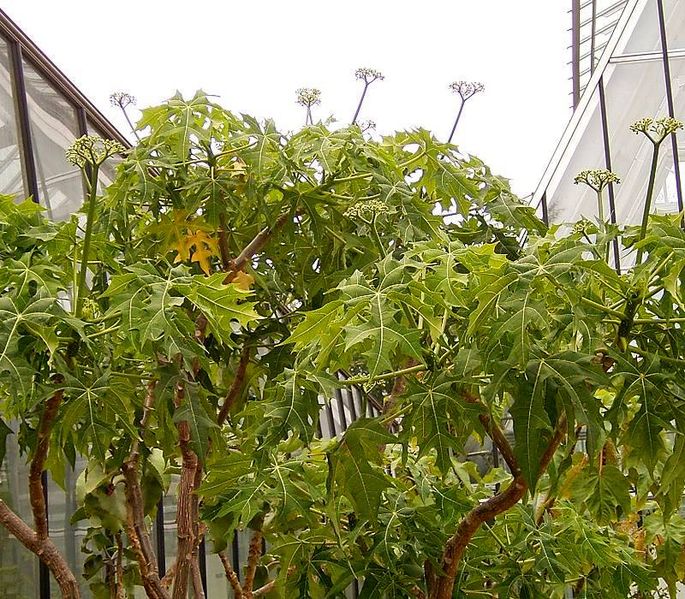Spinach Tree Care - How To Use Chaya Plants In The Garden

Growing tree spinach is a valuable food source in the tropics through the Pacific region. Introduced into Cuba and then onto Hawaii as well as Florida where it is deemed more of a pesky shrub, chaya spinach trees are also known as tree spinach, chay col, kikilchay, and chaykeken. Unfamiliar to many North Americans, we wonder what is tree spinach and what are the benefits of the chaya plant?
What is Tree Spinach?
Chaya spinach is a leafy green vegetable in the genus Cnidoscolus consisting of over 40 species, of which only chayamansa refers to chaya spinach tree. A member of the Euphorbiaceae family, growing spinach tree provides nutritious leaves and shoots for years and is prized as a necessary and important food through the Pacific Rim and along the Yucatan peninsula of Mexico, where is grows naturally in thickets and the open forest. Growing tree spinach is commonly cultivated in Mexico and Central America and frequently seen planted in home gardens. Chaya spinach tree is actually a big leafy shrub that reaches a height of 6 to 8 feet (around 2 m.) and resembles a cassava plant or healthy hibiscus, with 6 to 8 inch (15-20 cm.) cupped leaves borne on slender stems. Growing tree spinach shrubs bloom often with both male and female flowers that are tiny and white resulting in 1 inch (2.5 cm.) seed pods. The stem exudes white latex and the young stems have stinging hairs, particularly on wild growing tree spinach.
Spinach Tree Care
Growing tree spinach is cold sensitive, so it should be started at the onset of the warm season. Chaya spinach tree is propagated via woody stem cuttings that are 6 to 12 inches (15-31 cm.) long in well draining soil. It takes some time for the chaya to establish but after the first year, the plants may be pruned and harvesting commenced. Sixty percent or more of the foliage may be removed with no damage to the plant, and in fact, will promote bushier, healthy new growth. For the home gardener, one plant is sufficient to provide plenty of chaya. Spinach tree care for the home gardener is fairly simple. Chaya spinach is an understory species in forests and as such is ideal grown in shade under fruit trees or palms. Water the chaya canes thoroughly before transplanting. The spiraling roots of the starts should be trimmed so they are growing downward and the planting hole needs to be deep enough so they hang vertically. Add compost or green manure to the planting hole to add nutrients prior to planting the chaya spinach tree canes. Pack the soil firmly around the chaya starts and mulch around the transplant to retain soil moisture and reduce weed growth.
How to Use Chaya Plants
Once the plant has established and harvesting commenced, the question is, “How to use chaya plants?” Chaya spinach tree leaves and shoots are harvested young and then used much like leaf spinach. However, unlike leaf spinach that can be eaten raw, chaya spinach tree leaves and shoots contain toxic hydrocyanic glycosides. These toxins are rendered inactive after cooking for one minute, therefore, chaya must always be cooked. Sauté, add to soups and stews, can, freeze, dry, or even steep as tea. Chaya spinach is a valuable source of vitamins and minerals. Chaya has more iron than leaf spinach and high amounts of fiber, phosphorus, and calcium.
Gardening tips, videos, info and more delivered right to your inbox!
Sign up for the Gardening Know How newsletter today and receive a free copy of our e-book "How to Grow Delicious Tomatoes".

Amy Grant has been gardening for 30 years and writing for 15. A professional chef and caterer, Amy's area of expertise is culinary gardening.
-
 Looking For Plants To Give You The Soft And Fuzzies? Try These 5 Fuzzy Leaf Plant Options
Looking For Plants To Give You The Soft And Fuzzies? Try These 5 Fuzzy Leaf Plant OptionsLovers of texture, drama, silver foliage and tactile plants will adore these special sensory garden additions. These fuzzy leaf plant options will leave you all aglow
By Susan Albert
-
 Get Ready For A Summer Of Hummers! Grow These Full Sun Hummingbird Plants and Flowers
Get Ready For A Summer Of Hummers! Grow These Full Sun Hummingbird Plants and FlowersIf you’re lucky enough to enjoy a sunny backyard, make sure you are maxing out on your pollinator opportunities and grow these full sun hummingbird plants and flowers
By Tonya Barnett